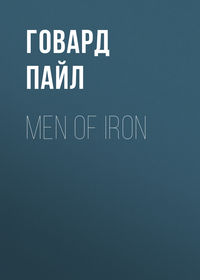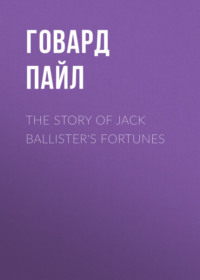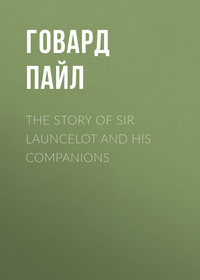 полная версия
полная версияRejected of Men
Nearly everybody of the truly Roman caste was there. Gilderman went, but he had not been feeling well, and so had only stayed out the musicale, coming away before the supper, for the sake of a few minutes’ midnight chat with his wife, who had promised, with the nurse’s consent, to be sitting up when he returned. She was much interested in all that he had to tell her, but she appeared tired, and he did not stay very long. As it was still early he went around to the club. The Dorman-Webster entertainment had nearly depleted the “Romans,” and Gilderman sauntered about with that lonely feeling that one always has in being at some place when one knows that one’s friends are somewhere else. He had found Pilate sitting in the reading-room with a litter of papers spread around him.
Pilate was not always asked to such entertainments as that of the Dorman-Websters’. He used to smile about it sometimes with his sphinx-like smile, but perhaps he would have been more than human had he not felt the fact of being left out of such lists of invitations. He looked up as Gilderman came in. “Why, Mr. Gilderman,” he said, “how is it you’re not at the silver wedding?”
“I was there,” said Gilderman, “but I did not stay.”
“Tired of it?”
“Oh no; not at all.”
Then Pilate began again: “By-the-way, Mr. Gilderman, I was very sorry that I did not feel justified in calling out the troops last Sunday, as the bishop wanted me to do. I hope he understood my position.”
“I think he did understand your position,” said Gilderman, almost dryly. Pilate looked at him for a little while with his keen, steady eyes. Perhaps he did not know just what construction to place on Gilderman’s phrase. Gilderman wondered whether he looked guilty of the double meaning he had intended. “Wouldn’t you like to play a game of billiards?” he said.
“Certainly,” said Pilate. And then to the club servant, as he arose from where he sat: “Tell Abraham to fetch the soda-and-whiskey up to the billiard-room when he brings it. You’ll have to allow me ten or a dozen points, Mr. Gilderman,” he said. “I can’t play billiards with you young fellows.” And then they went off together to the billiard-room.
Some little time after midnight the men began dropping in from the Dorman-Websters’ until there was quite a number present. About one o’clock a party of six or eight began playing poker, and in a little while afterwards Gilderman joined the game.
They had been playing maybe not over a quarter of an hour when those hands were dealt to Gilderman and Latimer-Moire which were afterwards so much talked about.
Ryan was dealing at the time, and Gilderman drew three cards to a pair of queens. The first card he turned up was a third queen, the next was an ace. He wondered passively how it would feel to draw a fourth queen, and then he turned up the card. It was the queen of clubs.
He felt struck almost as with a physical shock. He closed his cards slowly and laid them face down upon the table, and he was conscious as he did so that he had been able to infuse a perfect and complete expression of indifference into his face and action. Oh, if it were only possible now for some one to hold a hand to play against him!
Then the play began, and he saw almost immediately that even this desire was to be gratified. One by one the other men dropped out of the game until only Latimer-Moire and himself remained. The betting went steadily on and on, each time being to the full limit. The stakes doubled and quadrupled again and again. It passed through Gilderman’s mind, what if his opponent should, after all, have four kings? Such a chance was almost impossible, but the thought of it caused him a pang as it went through his mind. The rumor of the betting flew through the club, and quite a little crowd presently gathered around the table. Gilderman kept his cards face down upon the board. The men, as they came, went one by one around back of Latimer-Moire and looked into his hand. Nearly all of them laughed when they saw it. “Let’s see what you’ve got, Gildy?” said Stirling West, over Gilderman’s shoulder.
“No, by George!” said Gilderman, without looking around. He put his hand over his cards as he spoke. “I’m playing this hand alone,” he said, “and I’ll play it till the crack of doom, if need be.” As he spoke another sudden, dull spark of apprehension passed through his heart. What if Latimer-Moire should have four kings, after all?
The betting went on and on, and now there was perfect silence.
“Look here, old fellow,” burst out Gilderman, at last, “I tell you plainly you’re up against an almost certain thing. I don’t want to win your money, but I’m not going to give in as long as you keep at it.”
“You haven’t won your money yet, my boy,” cried Latimer-Moire. “Don’t you worry about me; I’ll look after myself,” and a general laugh went around the table.
One or two more bets were made, and then Gilderman called the game.
“I thought you were going to keep it up till the crack of doom,” said Latimer-Moire.
“It’s on your account I call the game,” said Gilderman. “Let’s see what you’ve got.”
Latimer-Moire laid down a card. It was the ace of clubs. He couldn’t have four aces, for Gilderman had one. What was it he had? What if he had four kings? Gilderman held his breath. Then his heart gave a bound and he knew that he had won. Latimer-Moire laid down a knave. Three more knaves followed, laid down upon the table one by one. What triumph! What glory! Gilderman held his cards firmly in his hand. His impulse was to pretend that he was beaten. “Well, well!” he said, trying to infuse all the disappointment he could into his voice, “who would have believed you would draw four cards and get four jacks by it? Well, well!”
“Let’s see what you’ve got, Gildy,” said West.
But still Gilderman lingered. The triumph was very, very sweet under the tongue of his soul. “Four jacks!” he repeated. “Well, well, well!”
“Oh, show up your hand, Gilderman!” called out a voice from those who stood looking on.
Then Gilderman laid down his hand, spreading all the cards face up upon the green baize tablecloth.
There was a moment or two of silence and then almost a roar of laughter. Stirling West fetched Gilderman a tremendous clap upon the shoulder. “Gildy’s luck forever!” he cried out. Latimer-Moire joined the laugh against himself, but very constrainedly. Gilderman relit his cigar, which had gone out. His hand was chill and trembled in spite of himself. He assumed an air of perfect calmness and indifference, but his bosom was swelling and heaving with triumph. Then he pushed back his chair and arose.
“Hold on, Gildy!” cried out Latimer-Moire. “Ain’t you going to give me a chance to win my money back?”
“Not to-night,” said Gilderman; “some other time maybe, my boy, but I can’t spoil such luck by playing another hand to-night, old fellow.”
“Why, confound it–hold on, Gilderman, you can’t go away without giving me some show. Just a couple more hands.”
“Not to-night,” said Gilderman, and then he walked away with Stirling West. Pilate had come to the table and was standing looking down at the cards that still lay face up upon the board. Some one was explaining the game to him. “Well,” he said, “I’ve been playing the game for about forty years now and I don’t think I ever saw a piece of luck like that. Four queens against four jacks!”
Gilderman, as he walked away, heard the words and his bosom swelled with a still bigger load of triumph. As he whirled home in the electric cab he lay back in the leather cushions and gave himself up to the delight of his triumph. He was filled full with a great and pervading joy. That last queen! What a delicious shock when he turned up the card and saw what it was! What a glorious piece of luck! And then he thought, what should he do with the money? He did not want Latimer-Moire’s money. He would hand it over to the bishop; that was what he would do. Suppose he gave it to that one-armed fellow the bishop had spoken about the other day. No; it was too much to give in a lump to a poor devil like that. He revolted somehow from the thought of doing that; he would hand it over to the bishop.
Presently the cab stopped at the sidewalk in front of his own home. The chauffeur jumped down and opened the door and Gilderman stepped out. He lingered for a little while after the cab had whirled away into the darkness. The night was very mild and pleasant, and the moon was beautiful. So he stood for a while smoking his cigar, thinking of his luck and feeling very happy. The white clouds of smoke drifted pallidly away in the milky moonlight.
Suddenly there was a disturbance some little distance up the street, and a lot of figures came out from the park. Then they came marching down the sidewalk. Even in the distance Gilderman could see the gleam of brass buttons and of official badges, and he knew that they had been making some arrest. As the crowd approached, Gilderman walked slowly up the broad stone steps to the wide vestibule above. The porter opened the door at his coming, but Gilderman did not immediately enter. He stood upon the top step smoking a last puff or two at his cigar before he threw it away, and watching, with a sort of idle curiosity, for the crowd to go past on the other side of the street. Presently they were there, passing under the wide aureola of light of the double cluster of electric lamps at the curb.
Then Gilderman saw who it was that they had arrested–it was He.
Gilderman could not see whether He had handcuffs upon the wrists, but two policemen walked one upon each side of Him. Two or three policemen came behind them, and there was quite a crowd of men besides, one of them with his head tied up in a bloody cloth. As they came under the circle of light one face was turned and looked straight at Gilderman. The features appeared to be calm and emotionless. There was no hat upon the head, and Gilderman was almost sure he saw red drops of moisture, as of sweat, shining on His brow. Then they had gone by and Gilderman stood looking after them. The hall porter had also come farther out into the vestibule to see the crowd as it passed by.
As Gilderman stood gazing after the departing figures another figure came down the street, this time upon the same side as that on which he stood. It was a man walking rather close to the curb. Presently he also came within the circle of light directly in front of the house. He seemed to shrink for a moment and then walked out into the street. He looked up quickly towards Gilderman as he passed, and then Gilderman recognized him. He was that one of the disciples whom he remembered having seen a few days before–the short, thick-set man with the bald head and curly hair and beard. He turned his face towards Gilderman as he passed. Gilderman came partly down the steps. “Stop a minute, my man,” he said; “I want to speak to you.”
The man hesitated for an instant and then stood still. He hung back in the partial darkness of the street, and as Gilderman approached he seemed to shrink back farther still.
“Was that your Master who went by just now?” asked Gilderman.
“Yes, sir,” said the man.
“Where are they going to take Him?” asked Gilderman.
“I don’t know,” said the man; “I didn’t have time to ask.”
He was looking furtively down the street. The crowd had disappeared in the distance, but Gilderman could hear the sound of voices and the tread of feet far away. There was just a flitting glimpse of them as they passed under a circle of light a block or so away.
“Where are you going now?” asked Gilderman.
“I don’t know,” said the man. “I’m going to see where they take Him.”
He stepped farther back into the street as he spoke. He lingered for a moment and then turned and went away in the direction the others had taken. After he had gone a little distance he began running. Gilderman could hear his footsteps passing away down the street farther and farther. He saw a glimpse of his figure flitting under a corner lamp, and then he was gone.
So it is that the life of that young man came just within touch of the agony suffered alone in the darkness of the garden. So it is that we all of us, rich in our possessions of happiness and of wealth, live each his life, unconscious of the divine travail going on beneath until suddenly the end of all comes and we stand face to face with that which has been done. So it is that, all unconsciously to us, beneath the thin and crackling shell of mundane life, God is working out His end and we know nothing of it.
We laugh, we sing, we dance, we love, we hate, we triumph and strive for joys that turn to ashes in the mouth, and all the time the divine phenomenon of life is working out its completion beneath those shadowy appearances of things real. Now and then, maybe, like this young man, we suddenly come face to face with the Divine Humanity and maybe feel the soul quake at His presence. Then the face passes by and we see it and think of it no more except as an incident.
As Gilderman turned and went up into his warm and well-lighted house, filled with its richness and delectabilities, he wondered passively what would be done to the Man; what would be the end of it all with Him. The baby was awake and crying, and as Gilderman went to his room he caught a fleeting glimpse of the silently moving nurse passing across the dim upper hall.
Oh, the triumph of finding that a fourth queen had been dealt him! Four queens! He saw just how that queen of clubs had looked when he turned it up. How the fellows had roared when he showed his hand!
He looked at his watch as he wound it up. It was half-past two o’clock.
XVII
THE END OF THE WORLD
AND so came the end. As all the world knows, we fulfilled our allotted mission and crucified the Truth.
Caiaphas was a merciful man–kind, gentle, and with a very loving heart. But his religion was cruel, relentless, and devoid of mercy. According to his creed, all men who disobeyed the laws of social order suffered eternal punishment as a penalty forever and forever in the life to come. Also, according to that creed, all men were in danger unless they believed the almost unbelievable things of Scripture. He himself would not have tortured or tormented a mouse for doing wrong or for going astray, but he assented, almost with equanimity, to the monstrous assertion that God Almighty would torture and torment a man forever and forever for sin or for disbelief.
It is strange that the religion of such a good man as Caiaphas should be of such a monstrous sort; it is still more strange that such doctrines should have appeared to him not only to be sacred and holy beyond measure, but to be the actual foundation of existing social order.
Nevertheless, such he held to be the case, and his dogmas appeared to him to be singularly sacred. For his religion he was cheerfully ready to sacrifice his own life or the life of another man.
Whether he reasoned about the matter or did not reason about it the fact remained that that dreadful thing was his religious creed, and when he deemed it in danger of overthrow he fulminated that terrible saying: “It is better that one man should die rather than that a whole nation should perish.”
So the one Man died, and the nation, having fulfilled its mission, perished also as a nation.
When Christ yielded up the spirit it was said that the sun was darkened and the earth shook and the veil of the Temple was rent in twain. But we–priests and Levites, scribes and pharisees–saw nothing of that. That cataclysm was seen only by the few who saw with the eyes of the spirit. To us the burning sun rode as majestically as ever; to us the earth stood firm; to us that Temple of Faith (that was never to be completed) stood also firm upon its foundations.
We came and went about our daily business, unconscious that anything had happened. For so it is, we see and think only of the things of the earth; for so it is that there is to us no other light than the light of the sun of this world, no other things than the things of this mundane universe–beyond these all is void and darkness. These mundane things stood firm and unshaken when the Son of Man yielded up the spirit, and only those who saw beneath the shell of things beheld the darkness and the terror.
A poor carpenter had died that the Law and the Gospel might be preserved, and a few rough fishermen–a few poor, ignorant, superstitious outcasts thought that they saw the flaming orb of day turned into a smoky blackness; that they felt the earth strain and crack beneath their feet; that they beheld the bulwarks of religion split in twain from top to bottom.
Gilderman was worried that morning because the baby had caught cold. The day was pleasant and the sun shone brightly. Do you think he would have believed you if you had told him, in the midst of his worries, that the most tremendous cataclysm of the world was about to occur?
He felt a great sense of relief when Dr. Wellington entered the study. “I’m so glad you’ve come,” said Gilderman, and the two shook hands almost cordially. At that same moment the old world came to an end and a new world began.
So the annihilation of the ages was beheld by the scribes, the pharisees, the priests, Levites, and Romans.
XVIII
THE SPIRIT AND THE FLESH
WHEN men have slain the Living Truth and a new age has arisen from its death, the world still rolls onward in its course and mankind does not know that anything has happened. Children are born into the world, men and women are married, others die, and only a few poor, lowly ones know the significance of that death and resurrection. Thus it must ever be. In the outer world there is no sign; each man pursues his own business and pleasure with just the same avidity as though God’s Truth had not perished in the flesh to rise again into the glory of resurrection.
Yea; judgment-day may come and the angel may blow his trumpet until the earth shall crack and heaven itself shall tremble, but the ears of man are deaf to the blast and his eyes are blind to the terrors that overhang the soul. In his ears are stoppers of clay and over his eyes is a film of flesh, and neither sound nor sight can reach him.
What wonder, then, that men not only deny their Creator and their Redeemer, but even refuse to believe that the soul within them is alive. To them the body seems alive and not the soul; to them it seems as though this world is the end of everything.
Mrs. Gilderman, though she had not recovered from her confinement with the rapidity that a washerwoman might have done under the same circumstances, was, nevertheless, so nearly quite well by the end of the month as to be able to be down-stairs and about the house. She did not go much abroad. Maybe on a fine afternoon she would take a spin in the park in the automobile or out along the river, but she did not go shopping, and was yet watched by her nurse with the jealous care due to a convalescent patient of such pre-eminent importance. But, though she did not go abroad, her friends came to see her, and she often held receptions in her own room with tea and wafers, maybe, and a babble of feminine chatter. She was conscious that her imported blue tea-gown was vastly becoming to her blond beauty, and she made the most of it, lying back in a nest of blue silk, silver-embroidered cushions.
It was about this time that she made Gilderman promise to have his portrait painted. “I want Reginald to have it to say,” she said, “that that is the way my father looked in the year that I was born.”
So Gilderman had commissioned Norcott to paint a full-length portrait of himself with a bit of realistic background showing a glimpse of the famous Cyprian Adonis fragment. No one living could do those little realistic bits of background as could Norcott.
During this same month the Biddington-De Vaux wedding was to come off at the national capital–Arabella Stewart Biddington and Lord George De Vaux, an attaché to a foreign embassy. Gilderman, on the score of relationship to Miss Biddington, had, of course, to go. That same day he was also to give a sitting to Norcott. He was growing very tired of these sittings. There had been a great many of them, for Norcott was endeavoring to make the work a chef-d’œuvre. At first Gilderman had been very much interested in the artist, his surroundings, and the studio in which he worked. Not only had Norcott much to say for himself, but he had collected about him an enormous amount of bric-à-brac, rugs, tapestries, and hangings. You would have pronounced the anteroom to the studio to have been cluttered were the things gathered there less fine and interesting than they were. The studio itself was a great, high-ceilinged room with a big skylight. There was more bric-à-brac, rugs, tapestries here, but in the wider spaces they did not seem so crowded together as in the anteroom. Gilderman had become pretty well acquainted with all these surroundings by now, and they were no longer so interesting to him as they had been at first. He sat there in the morning of the Biddington-De Vaux wedding feeling rather bored. He had to take the trip to the capital in the afternoon, too. That also was a bore in prospect.
The outer door of the reception-room of Norcott’s studio was so arranged that when it opened a chime of bells was rung. Norcott was working silently and industriously and Gilderman was sitting thinking about the nuisance of the impending journey, when suddenly the chime of bells rang out upon the silence of the studio. Presently Norcott’s Moorish servant came bringing in a card. Norcott looked at it. “It’s Santley Foord, Mr. Gilderman,” he said. “Would you like him to come in? He’s a very interesting fellow, and it might entertain you.”
“Santley Foord?” said Gilderman. And then, remembering the name: “Oh yes; he’s the fellow who wrote and illustrated those very interesting articles about the West-China imbroglio for the Mundane Sphere, is he not?”
“Yes, that’s the man.”
“I’d be very glad to meet him,” said Gilderman, welcoming any break in the monotony of the sitting.
Then Santley Foord came in. He was a lively, brisk little man, with a face burned russet-brown by the sun, a mustache nearly white, and very light, closely cropped gray hair. He had a strong jaw and chin, and his little eyes were as bright and as black as beads and danced and twinkled and were never still for a moment. Norcott introduced Gilderman, who bowed with a manner that was very urbane. Santley Foord was evidently extremely gratified by the introduction.
“I was very much interested in your West-China articles,” said Gilderman. “It seemed to me that your sketches were strikingly clever, too. That one with the dead bodies lying on the snow and the flock of crows around them and the long line of road cut through the snow and stretching away to the distance against the gray sky impressed me extremely.”
“I am highly flattered that you should have noticed it, Mr. Gilderman,” said Foord. “One can always get a capital effect of snow in reproductive process. And then, I suppose, the subject was very fetching. I stood there in the snow sketching the scene over the back of my Tartar pony, with the sketch-book resting on the saddle, while my two Kalmuck men brewed some tea in a deserted hut at the road-side.” Then he began describing incidental scenes connected with the circumstances of the massacre. He talked well, and Gilderman listened much interested.
From this subject, at a question from Norcott, the narrator branched out into his experience in a Tartar village. He described his introduction to a fat old Tartar chief, and he mimicked the obese Oriental with an almost startling vividness. Gilderman laughed heartily, and as he did so he registered in his own mind that he would give a man’s dinner-party and would ask Santley Foord. It would be very entertaining. How Stirling West would enjoy the fellow.
“But, after all,” said Foord, “you don’t have to go out to the far East to find such things. I’ve come across a mine of interest here that nobody seems to know or to think anything about. Did you, for instance, know that the disciples of that carpenter, about whom there was so much talk awhile ago, are still living here in the very midst of the city, a community in themselves? They claim to have had supernatural experiences and to have seen visions and all that sort of thing. They have strange religious ceremonies and meetings, in which they appear to go off into a trance state, and a good many of the poor people among whom they live believe all that they say to be a bona-fide fact.”









